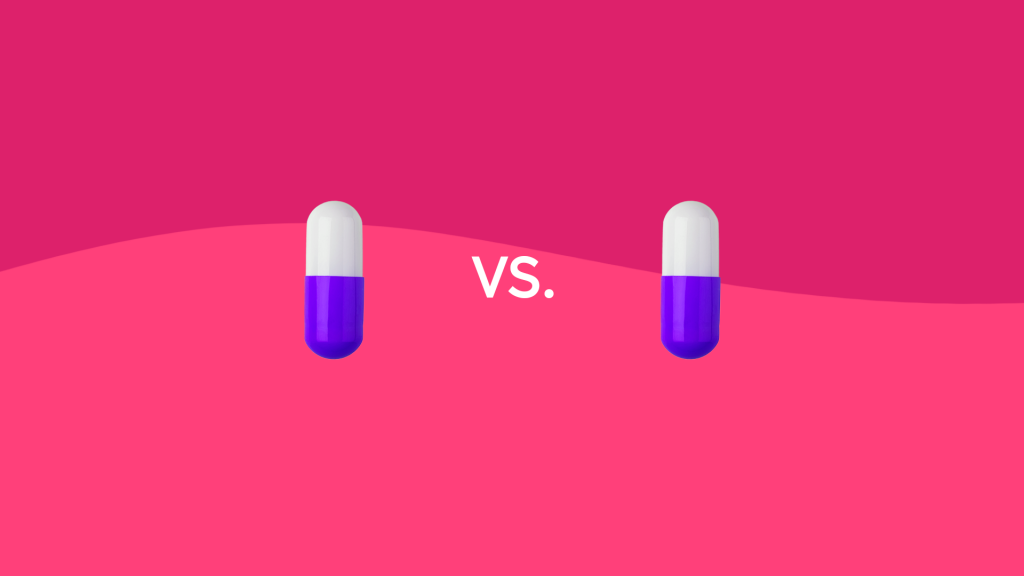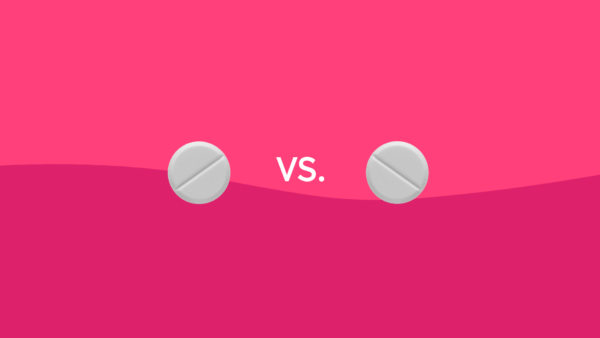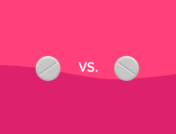Drug overview & main differences | Conditions treated | Efficacy | Insurance coverage and cost comparison | Side effects | Drug interactions | Warnings | FAQ
Protonix (pantoprazole) and Nexium (esomeprazole) are two medications used to treat problems of the digestive tract, such as gastroesophageal reflux disease (GERD). GERD is a chronic condition that develops when stomach acid regularly flows back into the esophagus from the stomach. This can lead to symptoms like heartburn and more serious complications like erosive esophagitis.
Both Protonix and Nexium are part of a drug class called proton pump inhibitors (PPIs). They work by blocking the proton pumps in the stomach, which are responsible for the production of acid. In effect, Protonix and Nexium help reduce the overall production of acid in the stomach.
What are the main differences between Protonix and Nexium?
Protonix, which is manufactured by Pfizer, is the brand name for pantoprazole. It is a prescription medication that is used to treat erosive esophagitis in adults and children aged 5 years and older. It is available as a 20 mg and 40 mg delayed-release tablet, as well as a 40 mg liquid suspension. In some cases, Protonix may be administered as an intravenous (IV) injection.
Nexium is manufactured by AstraZeneca and is the brand name for esomeprazole. It is available as a prescription or over-the-counter (OTC) drug that is used to treat GERD in adults, children, and infants aged 1 month and older. Unlike Protonix, Nexium comes as a 20 mg and 40 mg delayed-release capsule. Nexium is also available as a 2.5 mg, 5 mg, 10 mg, 20 mg, and 40 mg liquid suspension.
| Main differences between Protonix and Nexium | ||
|---|---|---|
| Protonix | Nexium | |
| Drug class | Proton pump inhibitor (PPI) | Proton pump inhibitor (PPI) |
| Brand/generic status | Brand and generic version available | Brand and generic version available |
| What is the generic name? | Pantoprazole | Esomeprazole |
| What form(s) does the drug come in? | Delayed-release tablet Granules packet for liquid suspension Intravenous powder for injection |
Delayed-release capsule Granules packet for liquid suspension Intravenous powder for injection |
| What is the standard dosage? | 40 mg once daily | 20 or 40 mg once daily |
| How long is the typical treatment? | Up to 8 weeks | 4 to 8 weeks depending on the condition being treated |
| Who typically uses the medication? | Adults and children aged 5 years and older | Adults, children, and infants aged 1 month and older |
Conditions treated by Protonix and Nexium
Protonix and Nexium can both treat GERD and conditions associated with GERD, such as acid reflux (heartburn). Both medications are also FDA approved to treat erosive esophagitis, or the inflammation of the lining of the esophagus.
Nexium is also FDA approved to treat Helicobacter pylori (H. pylori) infection. This type of infection develops when H. pylori bacteria infect the digestive tract, which can lead to ulcers. In addition to ulcers caused by H. pylori, Nexium can prevent the risk of ulcers associated with nonsteroidal anti-inflammatory drugs (NSAIDs).
Both Protonix and Nexium can be used to treat hypersecretory conditions, such as Zollinger-Ellison syndrome. These conditions are characterized by an overproduction of stomach acid. Protonix and Nexium may also be used to treat peptic ulcers, which encompass both duodenal and stomach ulcers.
Protonix and Nexium are only recommended for short-term use, or up to eight weeks in most cases.
| Condition | Protonix | Nexium |
| Gastroesophageal reflux disease (GERD) | Yes | Yes |
| Erosive esophagitis | Yes | Yes |
| Hypersecretory conditions | Yes | Yes |
| H. pylori infection | Off-label | Yes |
| Risk reduction of NSAID-associated stomach ulcers | Off-label | Yes |
| Duodenal ulcers | Off-label | Off-label |
| Stomach ulcers | Off-label | Off-label |
| Heartburn | Off-label | Yes |
Is Protonix or Nexium more effective?
Clinical trials have shown that pantoprazole and esomeprazole are similarly effective. One clinical trial compared the effectiveness of 40 mg of pantoprazole to 40 mg of esomeprazole in patients with GERD. Approximately 580 patients were randomized to receive either pantoprazole or esomeprazole over 4, 8, or 12 weeks of treatment. Complete remission of GERD was achieved with both PPI at similar rates.
In a randomized, double-blind clinical trial, the effectiveness of pantoprazole and esomeprazole was compared for treating GERD. Approximately 200 patients were randomized to receive either 40 mg of pantoprazole daily or 40 mg of esomeprazole daily. Both PPIs were found to be equally effective with comparable safety and tolerability.
Consult a healthcare provider for the best treatment option for you. Your primary care provider may refer you to a doctor who specializes in gastroenterology for further medical advice.
Coverage and cost comparison of Protonix vs. Nexium
Most Medicare and insurance plans will cover the generic version of Protonix, pantoprazole. Medicare copays could range from $0 to $17 for pantoprazole. Without insurance, the average cash price of Protonix is $522. However, with a Protonix coupon from SingleCare, the generic cost is about $11.
Some Medicare and insurance plans may cover Nexium or its generic version, esomeprazole. Medicare copays for esomeprazole could range from $1 to $41. The average retail price of Nexium is $478 depending on the quantity and strength prescribed. With a SingleCare Nexium coupon, the average price could be reduced to approximately $27.
| Protonix | Nexium | |
| Typically covered by insurance? | Yes, as the generic version | Yes, as the generic version |
| Typically covered by Medicare Part D? | Yes, as the generic version | Yes, as the generic version |
| Quantity | 30 tablets (40 mg) | 30 tablets (40 mg) |
| Typical Medicare copay | $0–$17 | $1–$41 |
| SingleCare cost | $11+ | $27+ |
Common side effects of Protonix vs. Nexium
The most common side effects of Protonix are headache, diarrhea, nausea, abdominal pain, vomiting, gas, dizziness, and joint pain.
Common side effects of Nexium include headache, diarrhea, nausea, gas, abdominal pain, constipation, and dry mouth.
Serious side effects of PPIs are often associated with long-term use. Serious side effects may include osteoporosis-related bone fractures, vitamin B12 deficiency, and low magnesium levels (hypomagnesemia).
| Protonix | Nexium | |||
| Side effect | Applicable? | Frequency | Applicable? | Frequency |
| Headache | Yes | 12% | Yes | ≥1% |
| Diarrhea | Yes | 9% | Yes | ≥1% |
| Constipation | Yes | <2% | Yes | ≥1% |
| Dry mouth | Yes | <2% | Yes | ≥1% |
| Nausea | Yes | 7% | Yes | ≥1% |
| Stomach pain | Yes | 6% | Yes | ≥1% |
| Vomiting | Yes | 4% | Yes | <1% |
| Dizziness | Yes | 3% | Yes | <1% |
| Gas | Yes | 4% | Yes | ≥1% |
| Joint pain | Yes | 3% | No | – |
Frequency is not based on data from a head-to-head trial. This may not be a complete list of adverse effects that can occur. Please refer to your doctor or healthcare provider to learn more.
Source: DailyMed (Protonix), DailyMed (Nexium)
Drug interactions of Protonix vs. Nexium
Protonix and Nexium, like other PPIs, interact with many of the same medications. These PPIs should be monitored or avoided with other drugs that are dependent on stomach acidity for absorption. Drugs that are dependent on stomach acidity for absorption include iron salts, erlotinib, ketoconazole, and mycophenolate mofetil.
Protonix and Nexium can also interact with antiretroviral drugs, or drugs that are often used to treat HIV. PPIs can increase or decrease blood levels of antiretroviral drugs, which can lead to an increased risk of toxicity or decreased effectiveness with antiretroviral drugs.
The use of Protonix or Nexium with warfarin may increase the risk of bleeding.
Nexium should be monitored or avoided with diazepam since it can increase blood levels of diazepam and lead to an increased risk of adverse effects. The use of Nexium and clopidogrel together should also be avoided. Nexium can decrease how well clopidogrel works in the body, which can increase the risk of blood clots.
| Drug | Drug type | Protonix | Nexium |
| Atazanavir Rilpivirine Nelfinavir Saquinavir |
Antiretrovirals | Yes | Yes |
| Ketoconazole | Antifungal | Yes | Yes |
| Ferrous sulfate Ferrous gluconate Ferrous fumarate |
Iron salt | Yes | Yes |
| Mycophenolate mofetil Methotrexate |
Immunosuppressant | Yes | Yes |
| Erlotinib | Chemotherapy | Yes | Yes |
| Digoxin | Cardiac glycoside | Yes | Yes |
| Warfarin | Anticoagulant | Yes | Yes |
| Diazepam | Benzodiazepine | No | Yes |
| Clopidogrel | Antiplatelet | No | Yes |
Consult a healthcare professional for other possible drug interactions
Warnings of Protonix and Nexium
The long-term use of PPIs may lead to an increased risk of bone fractures, especially in people who have already been diagnosed with osteoporosis. Bone mineral density may need to be monitored during long-term treatment with PPIs.
Some patients have experienced acute tubulointerstitial nephritis (TIN) while taking Protonix or Nexium. Nephritis is the inflammation of the kidneys, which can lead to decreased kidney function.
The use of PPIs may be linked to an increased risk of Clostridium difficile-associated diarrhea. Those who experience persistent diarrhea may need to be monitored, especially in a hospital setting.
Taking Protonix or Nexium can increase the risk of low blood levels of magnesium (hypomagnesemia) or vitamin B12 (vitamin B12 deficiency). There is an increased risk of hypomagnesemia and vitamin B12 deficiency in those on long-term treatment with PPIs.
Consult your healthcare provider for other possible warnings and precautions before taking a PPI.
Frequently asked questions about Protonix vs. Nexium
What is Protonix?
Protonix is a prescription-only PPI medication that is primarily used to treat erosive esophagitis associated with GERD. Protonix is available as a delayed-release tablet and liquid suspension. The generic name of Protonix is pantoprazole.
What is Nexium?
Nexium is a PPI medication that is used to treat acid reflux and heartburn, as well as erosive esophagitis associated with GERD. It is available with a prescription or over the counter. Nexium primarily comes as a delayed-release capsule or a liquid suspension. The generic name of Nexium is esomeprazole.
Are Protonix and Nexium the same?
Protonix and Nexium are two PPI medications that can treat GERD, hypersecretory conditions, and peptic ulcers. However, they contain different active ingredients and come in different formulations. Protonix contains pantoprazole and Nexium contains esomeprazole. Protonix can treat GERD in adults and children aged 5 years and older while Nexium can treat GERD in adults, children, and infants aged one month and older.
Is Protonix or Nexium better?
Protonix and Nexium are similar in effectiveness. The most appropriate PPI will be determined based on age, medical condition, cost, insurance, and other medications being taken.
Can I use Protonix or Nexium while pregnant?
Protonix or Nexium may be safe to take while pregnant. However, they should only be used if the benefits outweigh the risks. Currently, there are not enough studies to show that Protonix or Nexium is completely safe to use during pregnancy. Consult a healthcare provider for medical advice on the best treatment for GERD while pregnant.
Can I use Protonix or Nexium with alcohol?
While alcohol is not known to interact with Protonix or Nexium, it can worsen acid reflux and heartburn symptoms in some people. Alcohol use may be safe in moderation while taking Protonix or Nexium, but it is not generally recommended.
What is the most effective proton pump inhibitor?
The most effective PPI will depend on the condition being treated, the dosage of the PPI, and other medications a person might be taking. The cost of the PPI should also be taken into consideration when determining the most effective option.
What can I take instead of Nexium?
Nexium (esomeprazole) is a proton pump inhibitor. Other proton pump inhibitors include Prilosec (omeprazole), Prevacid (lansoprazole), Aciphex (rabeprazole), and Protonix (pantoprazole). If GERD symptoms do not improve with a PPI, a healthcare provider may recommend an H2 blocker medication instead. Examples of H2 blockers include Pepcid (famotidine), Zantac (ranitidine), and Tagamet (cimetidine).
Can Nexium make reflux worse?
Nexium is used to treat acid reflux. Discontinuing Nexium treatment earlier than recommended by a healthcare provider may lead to a return of reflux symptoms. Nexium might not work the same for everyone. If symptoms do not improve with Nexium, other treatment options may be recommended.





